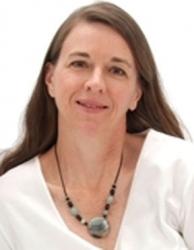5k Run / 1 Mile Walk Fundraiser To Benefit Lung Cancer Research March 28
Claire Howard Parker was diagnosed with lung cancer at age 30. One month later, she died from complications of the disease.
“It was such a senseless death,” says her mother, Cindy Howard, a nurse instructor at McNeese State University. Howard describes her daughter as a health nut who ate organically; a fitness instructor who taught cycling, yoga and weight-lifting classes; a world traveler and mountain climber; a woman full of life, with a promising future. Parker lived in San Diego with her husband, a Navy SEAL. And she was a non-smoker who grew up in a smoke-free home — the antithesis of a stereotypical lung cancer victim.
When Parker developed a nagging cough in 2007, doctors attributed it to the smoke from California wildfires. But over the course of months, the cough persisted, and she became increasingly short of breath. They told her she had pneumonia. When she didn’t recover after antibiotics, they did further testing, and finally discovered lung cancer. It took four months for her cancer to be diagnosed. No one suspected lung cancer in such a healthy, vivacious young woman.
Startling Statistics
“Lung cancer kills more people than breast cancer, prostate cancer, colon cancer and brain cancer combined,” says Jean Mount Kamla, spokesperson and founder of the Southwest Louisiana chapter of Free to Breathe, a national organization dedicated to raising funds for conducting lung cancer research, promoting awareness, supporting lung cancer victims and increasing lung cancer survivorship. Her brother, Ben Mount, who was also a non-smoker, died of lung cancer.
“Each day, it’s as if a jumbo jetliner crashes,” she says. “That’s how many people die of lung cancer per day; 463 people [each day] in North America.”
Though approximately 160,000 die each year of lung cancer in the United States, funding for research lags behind other types of cancer. According to Kamla, the federal government spends $1,800 per each cancer death. In comparison, $28,000 and $24,000 are spent on breast cancer and prostate cancer deaths, respectively.
A serious problem with lung cancer is a lack of early detection. Unlike mammograms for breast cancer, or PSA tests for prostate cancer, there is very little screening available for lung cancer. Most people aren’t diagnosed until the fourth, and final, stage. The current survival rate for lung cancer is only around 15 percent.
A new technology called spiral CT scanners is available, but only for those at high risk, for example those with a long history of smoking, and a strong family history. A lung cancer diagnosis is often a death sentence, but some patients do survive. As with all cancers, the key is early detection. The people who are diagnosed early are generally those who go in for some other procedure, and the doctors inadvertently discover lung cancer.
No One Deserves Lung Cancer
Kamla and Howard believe there is a negative stigma attached to lung cancer, which attributes to the lack of funding and early detection. There is a stereotype that a lung cancer victim is an elderly person with a long smoking history. This attributes to a misconception that lung cancer victims “deserve” the disease. “No one deserves lung cancer,” says Howard. “All you need to get lung cancer is lungs.”
While smoking is still the leading cause of lung cancers, it certainly is not the only cause — young women who have never smoked are the fastest growing population of lung cancer victims. Exposure to radon in homes can be a source of lung cancer. But increasing scientists are discovering genetic links to the disease. Kamla says lung cancers include more subsets of genetic mutations than any other cancer.
Promoting Public Awareness
When Kamla’s brother was diagnosed with lung cancer, even though she was a nurse, she was shocked. “I thought only smokers got lung cancer,” she says. But then she researched, and discovered the truth. According to the American Lung Association, up to 20 percent of lung cancer victims are non-smokers.
In addition to raising money for lung cancer research, Free to Breathe strives to educate the public on the realities of lung cancer, and remove the stigma associated with the disease.
“My goal is to keep pushing until people understand,” says Kamla.
Free To Breathe (And Walk, And Run)
Free to Breathe Southwest Louisiana will hold their annual fundraiser, a 5K/1 mile run/walk, on March 28 at the Lake Charles Civic Center. Registration begins at 7 am, and the run/walk at 8 am. The event is now in its eighth year, and Kamla expects around 1,000 people to participate. They will raise over $100,000 to fund the Ben Mount Louisiana Hope Research Grant for Lung Cancer. One hundred percent of the proceeds go directly to lung cancer research.
“I feel like we are giving our money to something legitimate that can make a difference in lung cancer,” Kamla says.
A Voice For The Victims
According to Kamla, most other cancers, such as breast and prostate cancer, have much higher survival rates than lung cancer. These groups have living survivors of the cancer who can be a voice for that particular disease. Lung cancer does not have that kind of survivorship. There are few survivors who can be advocates for the disease. That is why caring people like Kamla and Howard step up and volunteer. Family members, or close friends of the silenced victims, must continue to be the voice for lung cancer. “It’s hard, emotionally, to get involved, like picking at a scab that never heals,” says Howard. “But I want to leave a positive legacy, and make a difference. We do it because we love the person we lost. My dream is that one day, no one will face a diagnosis of lung cancer.”
For more information or to register for the event, go to freetobreathe.org/swlouisiana, or find their Facebook page.

















Comments are closed.